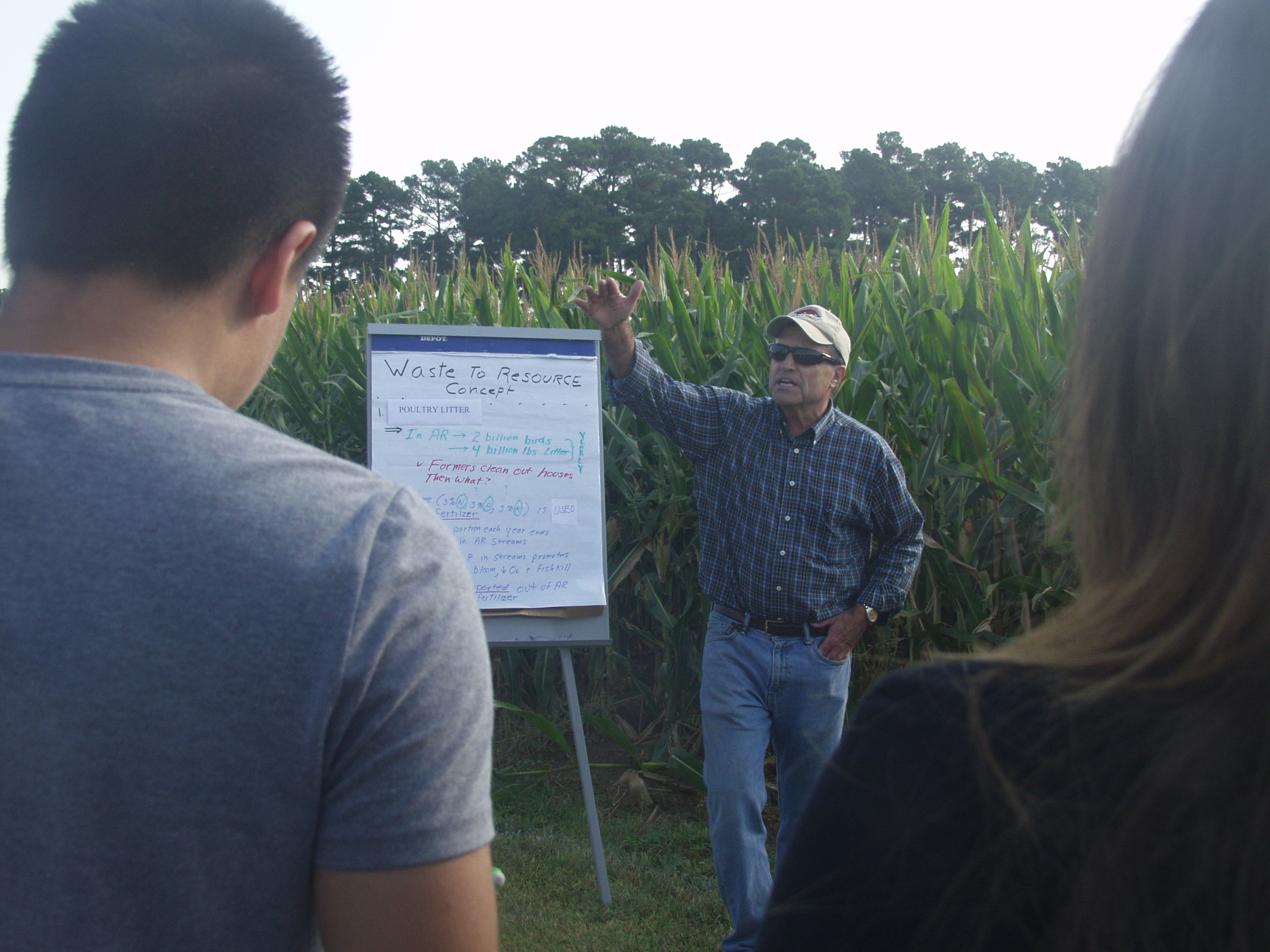High School Students View Research in Field During Environmental and Sustainability Outing

Professor David Longer explains to Springdale High School students the benefits of biochar for farmers and the environment during the fifth annual environmental and agricultural sustainability field trip sponsored by the department of crop, soil, and environmental sciences.
FAYETTEVILLE, Ark. – Professor David Longer likely alarmed a few of the visiting high school students when he offered them the opportunity to catch a whiff of a box of poultry litter, especially on a day outdoors with the sun shining and the temperature warming up.
But the exercise had its educational value as Longer, a professor of crop, soil, and environmental sciences at the University of Arkansas System Division of Agriculture, explained the path that the litter would take to eventually become an odor-free resource called biochar that farmers can apply to crops for higher yield.
The students' visit to Longer's presentation at the Arkansas Agricultural Research and Extension Center north of the Fayetteville campus was one of several stops they made Sept. 17 at the fifth annual environmental and agricultural sustainability field trip sponsored by the university's department of crop, soil, and environmental sciences. More than 230 students from Fayetteville, Springdale, Springdale Har-Ber and Rogers high schools and Hass Hall Academy in Fayetteville toured the Division's farm facilities where they spent more than two hours visiting short sessions hosted by department faculty and staff members. The lecturers explained issues in agricultural science and how people with careers in these disciplines are addressing those issues.
Longer explained to students at his presentation by a cornfield that when poultry litter goes straight to its role as fertilizer, part of it ends up in streams where its high phosphorous content kills fish and contributes to the growth of algae. He then told them about pyrolysis, a procedure for heating organic material at 1,000 degrees F, which turns the litter to biochar. The new substance still maintains a 3 percent level of the nitrogen, phosphorous and potassium that was in the litter, but it offers better options than the litter.
"Biochar supports soil microorganisms. There's a lot of microbial activity," Longer said. "In this field I have treatments where beneficial microorganisms were added to the soil with the biochar and the fertilizer. Much research shows higher yields. It's clean and it's odor free. It's very eco-friendly because none of it goes into the river.
"You also get a lot of energy off of pyrolysis that you can actually use to drive a steam turbine and produce electricity from it," he continued. "We're taking this waste and getting a fertility resource and also getting energy. That's a winner."
By using the biochar development process, which has been coming back into favor in agriculture after a long period of neglect, farmers can save money and increase their level of nitrogen use efficiency – getting the most yield from every pound of nitrogen applied.
In addition to its experiments with corn, Longer's research group is experimenting with biochar's effects on soybean and cotton. "It's something really fun to work with," he said.
Students on the morning tour also had the opportunity to view presentations on soil profiles, nitrogen and sustainability, a biodiesel plant demonstration project, soybean research, crop water supply, seed crossing and data collection, weed species' significance in crop production, the use of remote sensing to diagnose plant health and switchgrass production.
"We appreciate the teachers bringing their students to the experiment station to get a close-up look at some of today's environmental and agricultural practices in sustainability," said Holly Yeatman, recruiting coordinator for the department of crop, soil and environmental sciences. "Most of the students were advanced placement environmental science students, and they will be examining these topics in their classwork this year."
Students who enroll in the department's curriculum will pursue coursework in the university's Dale Bumpers College of Agricultural, Food and Life Sciences.
Topics
Contacts
Holly Yeatman, Recruiting Coordinator
Crop, Soil, and Environmental Sciences
479-422-5281,
hyeatman@uark.edu
Dave Edmark,
Agricultural Communication Services
479-575-6940,
dedmark@uark.edu
Headlines
Four Students Named Goldwater Scholars; Two Earn Udall Honorable Mentions
Four U of A students have received the prestigious Goldwater Scholarship, an award for top students in mathematics, science, and engineering.
Cross-Campus Collaboration Culminates in New Outdoor Geological Installation
Grand opening event to celebrate the new GeoLab installation at the U of A’s Gearhart Hall courtyard is set for May 3. The installation will be open to the public year-round.
First Students to Use Online Degree to Hone Nursing Leadership, Elevate Patient Care
Hanna Baxendale and Wendi Kimbrell will begin coursework in the Doctor of Nursing Practice-Executive Master of Business Administration program offered by the Eleanor Mann School of Nursing and Walton College.
Join the Office for Sustainability on a Final Cruise to Campus
Cruise to Campus Wednesdays have fostered a gathering space for individuals interested in biking to campus. Drop by the Old Main Lawn from 7:30-10 a.m. Wednesday for coffee, something to eat and conversation.
Fay Jones School Student Ambassador Program Gives Voice to Design Students
The student ambassador program at the Fay Jones School of Architecture and Design is built to connect top design students with their school, its alumni, its future students and others inside and outside the school.




